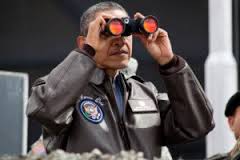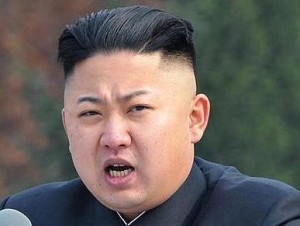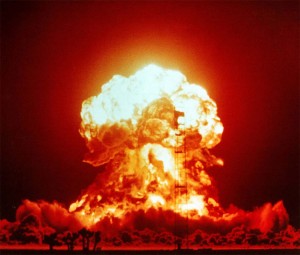Exclusive: North Korea has learned the lesson that surrendering WMD invites a U.S. invasion and murder of the leader – see Iraq and Libya – but talks to limit risks of another war remain an option, says Jonathan Marshall.
By Jonathan Marshall
The unexpected missile launch this weekend by North Korea hit a bulls-eye. Its perfect aim, however, owed more to Pyongyang’s mastery of international theatrics than to rocket technology.
Traveling just 310 miles, the intermediate-range Pukguksong-2 missile struck nothing but water in the Sea of Japan. But it fully succeeded, as planned, in grabbing the attention of two of North Korea’s biggest enemies: Presidents Donald Trump of the United States and Shinzo Abe of Japan.
Instead of relaxing over dinner at Trump’s $200,000-per-membership Mar-a-Lago club, the two heads of state had to surround themselves with advisers and translators Saturday evening, scrambling to draft a joint statement by the light of their cell phones.
They came up with the usual bluster: Abe denounced the launch as “absolutely intolerable,” and Trump vowed to stand behind Japan, America’s “great ally, 100 percent.” (Not even the missile crisis could stop Trump from crashing a wedding reception at the club’s grand ballroom, however.)
North Korean Premier Kim Jon Un certainly didn’t win any friends with the launch. China criticized it as a provocation, and Russia declared that the test was in “defiant disregard” of United Nations resolutions. But it gave Kim something to brag about at home and, more important, kept his demands front and center on the world’s stage.
No Good Options?
A Reuters news report summed up the conventional wisdom among U.S. analysts: “Few good options in Trump arsenal to counter defiant North Korea.” In a nutshell, President Obama’s eight-year policy of “strategic patience” — ratcheting up economic sanctions and diplomatic pressure — was a spectacular failure. Leaning on China to make it dictate terms to Pyongyang hasn’t worked either—in part because Beijing doesn’t want to risk triggering a collapse of North Korea’s regime. Tough U.N. resolutions condemning North Korea are worth less than a bowl of steaming kimche.

Near the ceasefire line between North and South Korea, President Barack Obama uses binoculars to view the DMZ from Camp Bonifas, March 25, 2012. (Official White House Photo by Pete Souza)
Then there is the military option. Its many advocates in Washington — including former Secretary of State John Kerry — argue the United States may need to wipe out North Korea’s nuclear and missile launch facilities, or even decapitate its regime, to prevent it from acquiring long-range missiles capable of reaching U.S. soil.
But North Korea’s nuclear facilities are designed to withstand anything short of a nuclear attack, and its conventional forces could quickly leave Seoul a smoldering ruin. How China would react to a preemptive U.S. attack is anyone’s guess. No less an authority than former Secretary of Defense William Perry says that a war with North Korea would be “catastrophic, possibly destroying the societies of both Koreas as well as causing large casualties in the U.S. military.”
A Voice of Reason
Perry is one of the few voices of reason who contests the militant groupthink prevalent in Washington. He counsels instead an attempt to engage Pyongyang in diplomacy. That strategy should appeal to the dealmaker who now inhabits the White House.

Donald Trump speaking with supporters at a hangar at Mesa Gateway Airport in Mesa, Arizona. Dec. 16, 2017 (Flickr Gage Skidmore)
As Trump said during his campaign, responding to Hillary Clinton’s disparagement of trying to engage with Kim, “What the hell is wrong with speaking? . . . It’s called opening a dialogue.”
Perry participated in the Clinton administration’s successful negotiation of a 1994 deal with North Korea that suspended its plutonium enrichment program. George W. Bush, in his wisdom, scrapped the agreement and made North Korea a charter member of his “axis of evil.”
Watching Presidents Bush and Obama in action, Pyongyang understandably redoubled its nuclear program. “North Korea has decided, based on lessons from Iran, Iraq, and Libya, that its only sure means of survival is to be ‘too nuclear’ to fail,” remarked Scott Snyder, a Korea expert at the Council on Foreign Relations, during a recent Senate Foreign Relations Committee hearing. Or as committee chairman Sen. Bob Corker, R-Tennessee, put it, “What they learned is, you get rid of your WMDs, we take you out.”
That exchange was a rare recognition by Washington insiders that Kim, however, brutish and blustering, is pushing his country’s weapons program for the same reason that other nuclear powers acquired the Bomb: not to commit suicide, but to deter enemies. His regime states unequivocally that “we will not use our weapons on anyone unless they have attacked us.”
As Perry commented in January, “During my discussions and negotiations with members of the North Korean government, I have found that they are not irrational, nor do they have the objective of achieving martyrdom. Their goals, in order of priority, are: preserving the Kim dynasty, gaining international respect and improving their economy.”
Risk to Peace
Those words offer only a small measure of comfort, however. A nuclear-armed North Korea, with its inherently unstable political system, remains a huge risk to peace — all the more so if it prompts revived militarism in South Korea and Japan and unleashes a regional arms race.
The logical response is to try diplomacy, not more military threats, to reduce North Korea’s sense of isolation and paranoia. As China’s foreign ministry has repeatedly pointed out, “the root cause (of) the North Korea nuclear missile issue is the conflicts between North Korea and the United States, as well as between North and South Korea.”
The place to start resolving those conflicts, according to many Korea experts, is with negotiations to end the state of war between North Korea and its adversaries. The Korean War ended in 1953 with a temporary armistice, not a peace treaty. Washington’s failure to negotiate such a treaty tells a deeply insecure Pyongyang that the United States views its regime as illegitimate and ripe for forcible change.
By refusing to consider unconditional normalization of relations with North Korea, President Obama forfeited real opportunities to rein in its nuclear program. Instead, he continued holding huge annual military exercises with South Korea, complete with mock amphibious landings, which sent Pyongyang into “a frenzy of bloodthirsty threats and sabre rattling.”
North Korea’s ambassador to the United Nations told a reporter in November that diplomacy remains a viable option: “If (Trump) really gives up the hostile policy towards DPRK, withdrawing all the military equipment from South Korea, including the U.S. troops and coming to conclude the peace treaty, then I think it might be an opportunity to discuss the relations as we did in the 1990s.”
That was a rhetorical opening position, not a final demand, but it pointed to a peaceful way forward. Diplomacy offers no panacea. In particular, nothing will likely put North Korea’s nuclear genie back in its lamp anytime soon.
As Perry observed, “We lost the opportunity to negotiate with a non-nuclear North Korea when we cut off negotiations in 2001, before it had a nuclear arsenal. The most we can reasonably expect today is an agreement that lowers the dangers of that arsenal. The goals would be an agreement with Pyongyang to not export nuclear technology, to conduct no further nuclear testing and to conduct no further ICBM testing. These goals are worth achieving and, if we succeed, could be the basis for a later discussion of a non-nuclear Korean Peninsula.”
Joe Cirincione, a leading arms control expert, reminds us that “It was the negotiations, not the sanctions, that ultimately stopped Iran’s (nuclear) program.”
President Trump, a harsh critic of the nuclear treaty with Iran, now stands at a critical crossroads with North Korea. Will he heed the increasingly loud demands of interventionists for greater shows of force on the Korean peninsula, or channel candidate Trump and seek talks with Premier Kim? It’s no exaggeration to say that the fate of world peace may rest in part on his decision.
Jonathan Marshall is author of many recent articles on arms issues, including “Obama’s Unkept Promise on Nuclear War,” “How World War III Could Start,” “NATO’s Provocative Anti-Russian Moves,” “Escalations in a New Cold War,” and “Ticking Closer to Midnight.”



Good article. I would also ask readers to recall (or learn for the first time) the fact that our (US) Government agreed to build two nuclear power plants in exchange for North Korea’s agreement to halt its nuclear weapons program, and then not only did not complete those promised plants but did not even get them off the drawing board during the multiyear period when they were supposed to have been built. As a Korean War veteran, I find it inexcusable and disgusting that since the 1953 truce with North Korea (and China) was signed, there really have been no good-faith efforts by my Government to negotiate a peace treaty. And I cannot forget that, with all of my Government’s preaching of freedom and democracy throughout the planet, from 1953 until 1991 our Government happily supported an unbroken succession of military dictatorships in South Korea. And the end of those dictatorships did not come as a result of my Government’s insistence on freedom and democracy, but rather from the South Korean people’s decision that they wanted a change in their own lives. Meanwhile, other peoples like those of the Kingdom of Saudi Arabia are still awaiting the “democracy and freedom” that my Government insists must be installed elsewhere than Saudi Arabia. And so it goes.
Pardon me, Cain (Un) but where is your brother Abel? A more helpful comment would be; when will the international community stop starving these people? The North’s standing armies are taking naps in the afternoons instead of exercising, they are pencil thin, and barely exist on a 1,200 calorie/d diet? Let’s not forget the horror they suffered just a dozen years ago, two million people, left to eat twigs and bark off trees. Don’t blame Un folks, blame Rummy Rumsfeld, he lobbied congress, President Clinton and ABB Switzerland to construct two nuclear power plants in North Korea. The North could have been a showcase, a landmark experiment that combined wind, solar and wave power, depositing these energies into battery farms. Does anyone still believe, for one moment, that the Chinese CCP would not have financed such an endeavor?
As in other ways, GW Bush made this situation worse. If only Americans (like Ambassador Perry, it seems)would consider other points of view and trust that sometimes an agreement, not violence or bribery, might be worth trying. The tough guy stance forces similar behavior, as we see with Russia being encircled by NATO and “for some reason” feels insecure and ups the ante too.
Plainly the US caused this problem and has failed over 64 years to stop its extreme provocations and hypocrisy.
The solution is to stop the provocative exercises and alter US forces in SK to support only a strong defense, then engage in diplomacy including at least apologies for the apparent secret bombing of NK after the war, which may have caused over one million civilian deaths. Remove the anger and fear for a decade, and we can negotiate.
The US actions in Korea after WWII were naive in the extreme and likely provoked invasion, but in any case its actions after the Korean War have been uniformly provocative and serve no one but US right wing demagogues seeking a foreign enemy to demand domestic power. We must end these practices of sending the military, the worst possible diplomats, abroad to make foreign policy by secret provocations suiting only their own career agendas and ideology of bullying.
So long as North Korea is in a state of war with the USA it would be extremely foolish to give up it´s nuclear weapons.
There is no other country on earth as untrustworthy as is the USof A. Invasion, occupation, murdering leaders of countries they do not like and killing is what they do.
Yes.
Then there is the military option. Its many advocates in Washington — including former Secretary of State John Kerry — argue the United States may need to wipe out North Korea’s nuclear and missile launch facilities, or even decapitate its regime, to prevent it from acquiring long-range missiles capable of reaching U.S. soil.
There is an old saying attributable to the Chinese that comes in a variety of translations that basically say that in a dispute the first person or side that resorts to violence reveals a lower level of intelligence or the weaker case.
From the Asia Times: North Korean leader’s half brother murdered in Malaysia. Kim Jong Nam dies in Malaysia after two female agents injected him with poison, government sources say – http://www.atimes.com/article/north-korean-leaders-half-brother-murdered-malaysia/